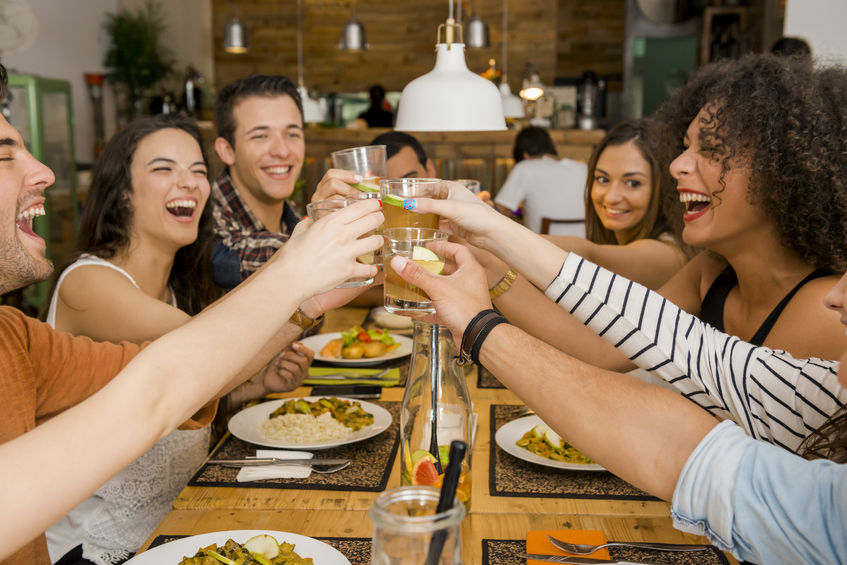Why How You are Eating Matters?
Last week, I talked about why weight loss goals are the top New Year’s resolution, yet so many people quickly fall of the bandwagon. The key to success, studies revealed, was learning to “play offense” and actively avoid tempting situations. This absolutely related to the question “What do I eat?”
If we plan ahead and have our homes, offices, cars, bags, etc stocked with healthy options, we are in control of what we eat. Did you guys take the challenge and purge your kitchen of “empty calorie” foods such as chip, crackers, cookies, etc that will leave you wanting more? Did you replace those with nuts/seeds, fruits, veggies, yogurt, string cheese, and lean meats and/or jerky? When you opted for more nutrient-dense options, did you find that you were more satisfied and less inclined to snack?
This week, I want to address the question “How do I eat?” Most often, when I ask my clients this question, they tell me they eat while at their desk doing work. In today’s society, this is the “norm.” Research shows that only 1 in 5 people actually take a lunch break. We have the misconception that taking a “working lunch” will lead to increased productivity. According to Kimberly Elsbach, a professor at the University of California, Davis Graduate School of Management, who studies workplace psychology, “ staying inside, in the same location, is really detrimental to creative thinking. It’s also detrimental to doing that rumination that’s needed for ideas to percolate and gestate and allow a person to arrive at an ‘aha’ moment.”
In addition to not allowing ourselves to take the mental rest needed for creativity to thrive, we don’t allow our brains to register that we’re actually eating a meal. A recent study showed that showed playing solitaire (on the computer) dampened people’s memories of lunch, which, in turn, may have caused them to eat 125 calories more when they snacked later.
That type of eating equates to a gain of one pound a month.
If you don’t eat at your desk, you can probably relate to eating in your car en route to work, kid’s sports practices, etc. How about eating standing up or shoveling down your food because you only have a limited amount of time?
Here’s the biggest piece of advice that was given to me in regards to eating habits:
Sllllllloooooowwwwww down!
In a society where it’s normal to constantly be on the go, it is essential to take time for us. Allow your body to rest and decompress!
It takes about twenty minutes from the start of a meal for the brain to send out signals of satiety. Most of us try to scarf down our food in 15 minutes or less!
Think about the additional calories you could consume simply because you didn’t allow your body time to register that it no longer required food. Now imagine the effect of those extra calories on your weight. According to Precision Nutrition, “Eating slowly also helps us feel more satisfied — which is different than just being “full”.”
Here are several reasons why eating slowly is so important:
1. It leads to improved digestion. The mouth is where digestion begins. When we take large bites and don’t allow time to adequately chew our food, it becomes more difficult for our stomach to break down food with digestive enzymes. When food isn’t properly broken down, we experience indigestion and/or other GI problems.
2. It helps to keep portions in check. When you eat slowly, you allow your brain to register that you’re eating a full meal and you allow your stomach to catch up with you’re brain! Naturally, you feel satisfied with less. In a study by the University of Rhode Island, researchers compared the difference in food consumption between the quickly eaten lunch and the slowly eaten lunch.
- When eating quickly the women consumed 646 calories in 9 minutes.
- When eating slowly the women consumed 579 calories in 29 minutes.
That is 67 less calories in 20 more minutes!
3. It reduces stress. Excess stress leads to increased Cortisol production. Cortisol has been linked to decreased fat utilization (we don’t burn fat very efficiently) and increased weight gain in the midsection. Be in the moment, rather than rushing through a meal thinking about what you need to do next. When you eat, you should eat. Let your mealtime be a time where you can savor each bite, appreciate the textures and aromas of your food. This will enable you to nourish your body and your soul.
So, with all of this information, how do you start changing your eating?
Here are some steps to help you slow down your eating habits in a manner that will feel more natural.
- Step away from distraction. Rather than sitting in front of the T.V., computer or phone set aside a deliberate eating place that allows you to focus on your food.
- Chew your food! It is recommended to chew at least 17 times between each bite. I know this seems tedious, but try it just once so that you have an idea of what your eating pace should
- Put down your fork between each bite. If counting to 17 with each bite just isn’t realistic, putting down your fork allows more time to chew.
- Have a conversation with a friend/co-worker! When you’re talking with someone, naturally, you put down your fork and slow down your eating pace.
- Plan, plan, plan. Have healthy options available so that you don’t get to the point where you’re ravenous. When you’re ravenous it is nearly impossible to eat slowly!
Experiment this week.
See if by taking time to enjoy your food increases satiety and decreases portion size. This is a challenge for me too so I’ll be doing this right along with you.
Resources:
http://amihungry.com/what-is-mindful-eating/
http://www.medicinenet.com/script/main/art.asp?articlekey=53304&page=2
http://www.precisionnutrition.com/all-about-slow-eating












